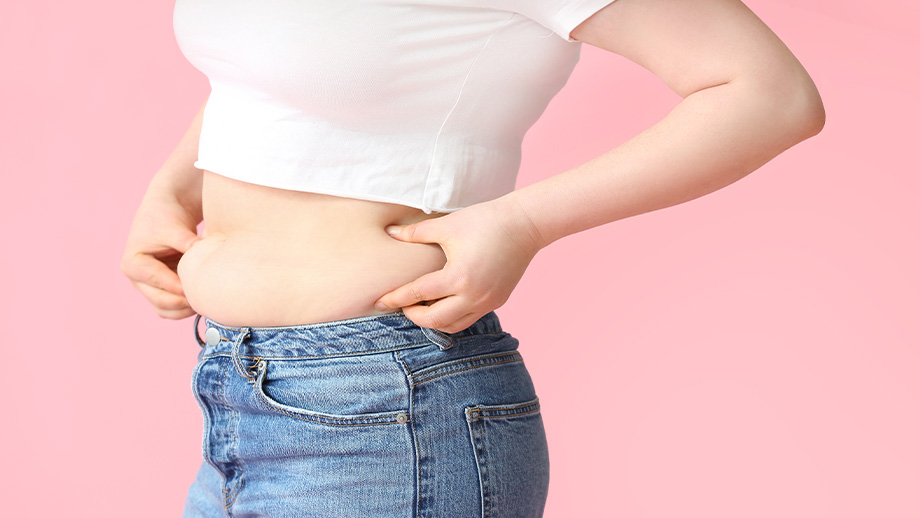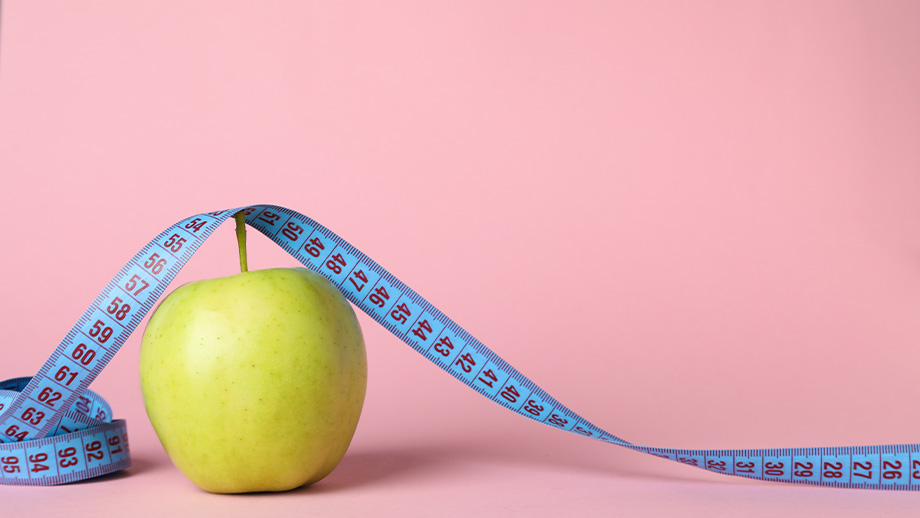If you have PCOS and carry extra weight around your stomach, you may wonder why you struggle to lose belly fat. Polycystic ovarian syndrome causes many hormonal imbalances leading to a myriad of symptoms. The ones that affect your physical appearance can cause more emotional stress, such as PCOS stomach.
We’ll explore why women with PCOS experience weight gain in the midsection and what they can do to improve it and their health.
What Does a PCOS Belly Look Like?
What some refer to as PCOS belly simply means an increased weight gain around the abdomen. It can look different for certain individuals depending on their body type, height, and other factors.
However, some women with PCOS have rounder stomachs due to increased abdominal visceral fat. This type of fat lies behind your muscles deep within the belly and often wraps around the organs. But individuals may also have subcutaneous fat, which sits just below the skin, on top of the muscles.
Women with PCOS may carry more weight around their stomachs and less around other areas of the body, making the weight distribution uneven in some individuals. This can contribute to a more “apple” body shape.
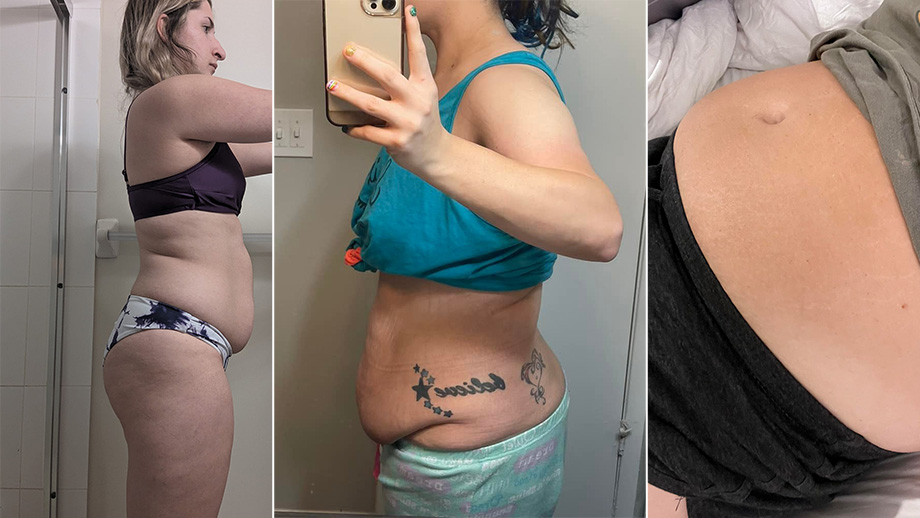
Mariah / Elizabeth / Leeza
What Causes PCOS Stomach Fat?
Several factors contribute to PCOS stomach fat, including high androgens, inflammation, and insulin resistance. However, all of these factors come down to hormonal imbalances. Polycystic ovarian syndrome impacts the endocrine or hormonal system.
Some women have a genetic predisposition to insulin resistance which can lead to belly fat gain. Often you do nothing to cause these symptoms.
However, insulin resistance causes your ovaries to overproduce androgens, leading to a greater propensity to develop deep belly fat. Then the increase of this fat can trigger chronically elevated levels of inflammation.
Androgens are male sex hormones that men and women produce, though in different amounts. In women with PCOS, decreased levels of sex-hormone binding globulin mean those increased free androgens can roam unhindered and cause symptoms such as belly fat gain, facial hair growth, and acne.
The conditions caused by hormonal imbalances create an environment that makes it easy to gain weight and hard to lose. Managing core causes of belly fat gain, including insulin resistance, high androgens, and inflammation, can help.
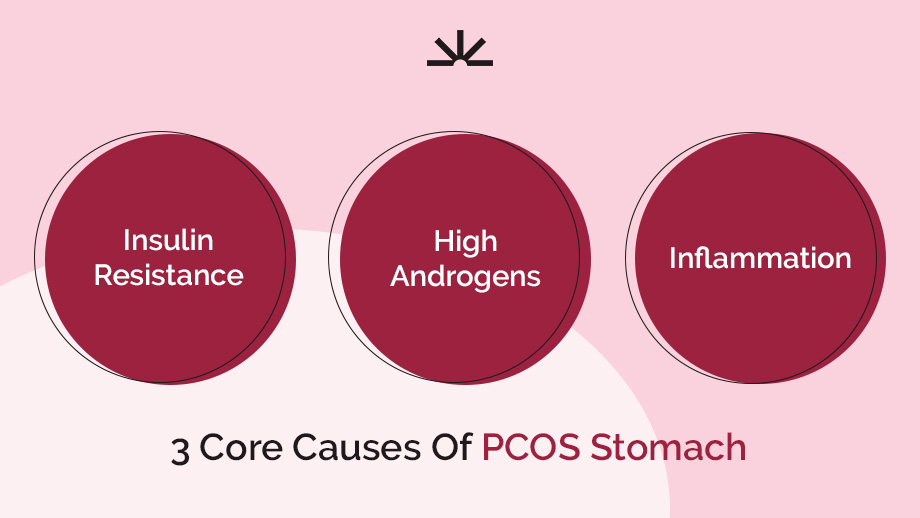
Core Causes of PCOS Stomach
Can PCOS Cause Stomach Inflammation?
Increased visceral fat between your organs releases hormones that alter the metabolism. Thus, the fat cells act as an endocrine organ.
In addition to producing hormones, it also releases toxins and cytokines, which are inflammatory molecules. The extended-release of these molecules leads to chronic inflammation. Inflammation is simply your immune system’s response to an irritant or damage. Extended periods of these responses can damage cells and lead to other illnesses and diseases.
And because visceral fat surrounds vital organs and leads to inflammation, it can lead to a higher risk of diabetes, heart disease, liver disease, gallbladder disease, high blood pressure, and high cholesterol.

Stomach Inflammation
Does PCOS Belly Go Away?
Without changes, visceral fat won’t go away on its own. But you can take steps to reduce PCOS belly fat and achieve hormonal balance. The issue is that the methods for losing weight differ between each person and what type of fat you want to lose.
The good news is, according to the Cleveland Clinic, you can lose visceral fat easier than subcutaneous fat as it metabolizes easier in the body. Additionally, as you take control of the underlying causes of your PCOS, you can reduce your symptoms and start to lose belly fat.
So let’s talk about different methods for getting rid of excess abdominal weight.
What Supplements Should I Take for PCOS Belly?
The supplements you take to help reduce belly fat depend on your PCOS type and underlying drivers. For example, a woman with androgenic PCOS that doesn’t have insulin resistance may want to focus on supplements that lower androgen levels.
But a woman with insulin resistance may want to work on improving insulin sensitivity and managing blood sugar. Some supplements that have helped lead to weight loss and lower body-mass index (BMI) in PCOS include Myo-inositol, L-carnitine, chromium picolinate, and berberine.
With so many options, you may wonder where to start with PCOS supplements. Review this guide for more information, and talk to your healthcare provider about what they recommend. But here are a few supplements for PCOS backed by science to help get rid of hormonal belly fat.
Myo-inositol
Myo-inositol is a type of sugar that helps process insulin. Studies show that it can reduce BMI, insulin resistance, luteinizing hormone (LH), and LH/FSH ratio.
Less insulin in the blood means lower androgen levels. Lower androgens mean your body stores less visceral fat causing PCOS belly.
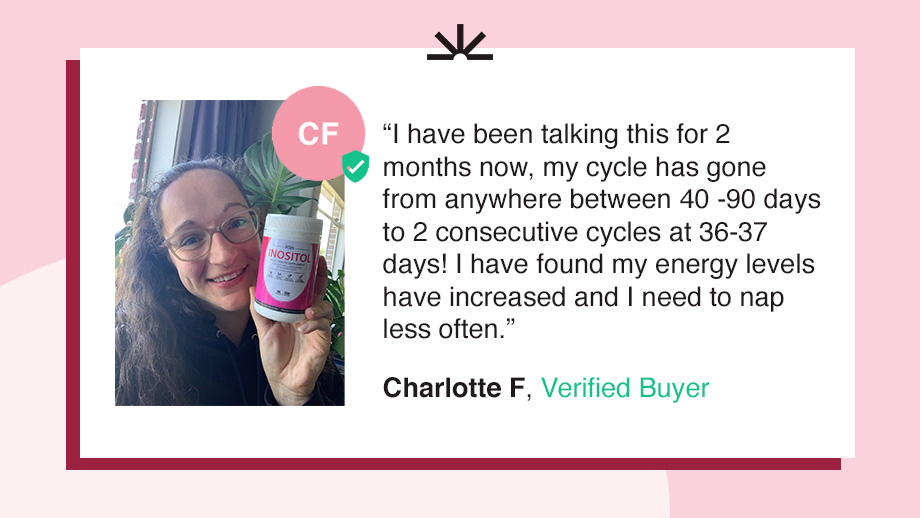
H&B Vitamin’s Inositol Review / Charlotte F.
L-Carnitine
L-carnitine is an amino acid produced in the brain, kidneys, and liver that turns fatty acids into energy. It can help improve insulin sensitivity and bad cholesterol. Additionally, studies show that it decreases BMI and improves menstrual cycle regularity and hirsutism.
Chromium Picolinate
Chromium picolinate supplements can help the hormone insulin work properly in the body and treat type 2 diabetes. A systematic review and meta-analysis published in the National Library of Medicine found that chromium supplementation had beneficial effects on decreasing BMI, fasting insulin levels, and free testosterone in women with PCOS.
Berberine
Berberine is a naturally derived chemical found in plants such as Oregon grape and tree turmeric. It has anti-inflammatory properties and can improve insulin sensitivity and lower cholesterol. This can help you lose stomach fat by targeting its root causes.
Try our research-driven supplements, formulated for the unique needs of women with PCOS.
Carefully crafted vitamins that combine the latest science with inspiring results. Supporting hormonal & metabolic health in those who need it most*. With over 2,800 positive reviews.
Find the right supplement for you
How to Get Rid of PCOS Belly
Do you need to know how to reduce PCOS stomach fat? Though it can be hard to lose stomach fat with PCOS, it’s not impossible. It may take much longer to see results, but with perseverance and lifestyle changes, you can get rid of excess fat and balance your hormones.
Here are some things you can consider to lose stomach fat with PCOS, but remember, not every method will work for everyone. Consider what things will work best for you to implement.
Eat a Healthy Diet
Diet doesn’t mean restricting food, counting calories, and never eating sweets. Diet means the foods you habitually consume for nutrition and health management. To lose PCOS stomach fat, you’ll need to make long-term lifestyle changes and eat the right nutrients your body needs.
Some key factors include limiting fatty foods and processed sugar. Look for lean proteins, low-fat and nutrient-rich foods. This means instead of having a bowl of sugary cereal for breakfast, opt for high protein and fiber, such as a spinach omelet.
And you may ask, “Do I need to cut out dairy, gluten, and sugar altogether?” The answer is no. You might choose to cut one of these things due to an intolerance or preference, but there are no foods that someone with PCOS can never eat again. However, you do want to minimize certain foods and maximize others.
Focus on anti-inflammatory foods, antioxidants, fiber, protein, and healthy fats. The key is not limiting everything but moderating what you eat and how much. We don’t want to eat tons of processed, fatty, and sugary foods all the time.
But when you focus on adding nutrient-rich foods into your diet, you can start to see improvements on a hormonal level. This can then lead to a breakdown of belly fat.
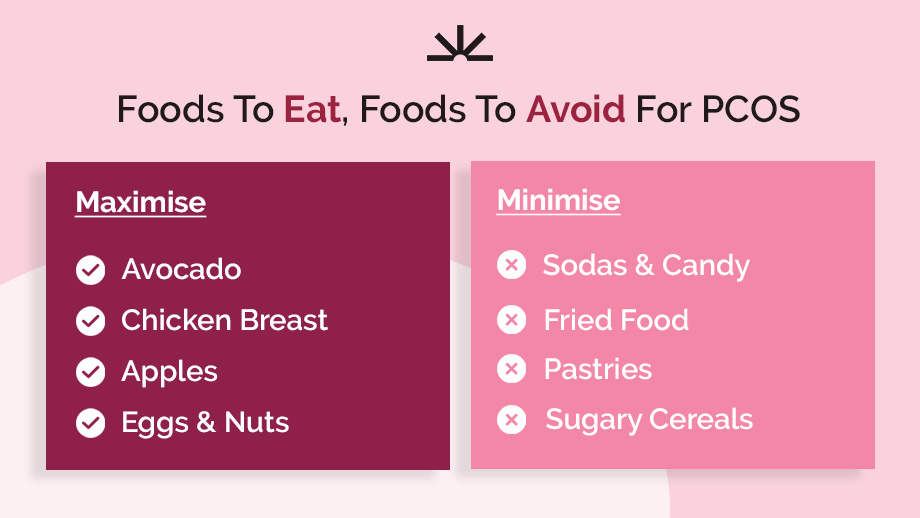
PCOS Foods To Eat, Foods To Avoid
Be Active and Exercise
An inactive lifestyle can contribute to the build-up of visceral fat. Doing the right exercise for your body can help you get rid of excess PCOS stomach fat. But know that an exercise plan that works for one person won’t work for another.
Consider your physical ability, schedule, and interests when making a workout routine. Choose something you enjoy and can stick to. Regular exercise over an extended time leads to greater results. Things as simple as going for morning walks can help. You may choose high-intensity interval training (HIIT) at the gym or at home.
Weight and resistance training can help you gain muscle, improving insulin sensitivity and cell function. Studies show strength training improves “insulin resistance, glucose metabolism, and resting metabolic rate, and lowers body fat.”

Best Exercise Types For PCOS
However, over-exercising can lead to an increase in the stress hormone cortisol. Women with PCOS should aim for sufficient rest days in between high-intensity workouts. You can balance this with daily activity, such as walking and remaining active.
Finally, combining a good diet with exercise and other healthy practices can have a greater impact on reducing waist circumference and stomach fat.
Get Good Sleep
During sleep, the body can rest, restore, and heal itself. But poor sleep can lead to spikes in cortisol, which tell the body to conserve energy for later. But this increase in cortisol can lead to drops in insulin sensitivity. When your body can’t process insulin, it can cause you to gain stomach fat due to the chain reaction.
Insulin leads to high androgens and stimulates visceral fat production. So getting good quality sleep can affect your hormones, weight, mood, energy, and metabolism.
Aim for 8 to 9 hours of sleep a night. Create a sleep schedule by going to bed and waking at the same time every day, even on weekends. Limit screen time and late-night meals. Quality and sufficient sleep can improve the results of diet and exercise.
Minimize Stress
As mentioned, the stress hormone cortisol can contribute to imbalanced hormones and insulin resistance. Limiting stressors, physically and environmentally, can help you get rid of PCOS stomach fat. Prolonged high-stress levels tell your body to conserve fat and increase cravings.
You can minimize environmental stress through meditation, self-care, journaling, and other relaxing activities. However, you can’t simply eliminate every stressful thing in life. But stress doesn’t just come through outside influences.
Things like inflammation, poor sleep, and poor immune system responses can also increase cortisol and internal stresses on your body. Reducing these through diet, supplementation, exercise, sleep hygiene, and others can help you lose belly fat and manage your PCOS symptoms.
Medication
Due to the viscous cycles that PCOS causes, losing weight can be difficult. One imbalance leads to another, which worsens the first. This creates an internal climate that resists weight loss and promotes weight gain.
Sometimes medications can help you take an extra step toward getting rid of PCOS belly fat. You may find many options often prescribed to treat type 2 diabetes or PCOS, such as metformin, Ozempic, and Mounjaro.

Weight Loss Pill / Valerii Honcharuk
Medications like metformin aim to address the root causes of insulin resistance and high androgens. It can help some women lose weight and regulate their blood sugar cravings.
However, prescription medications don’t work for everyone. Metformin can have side effects such as nausea, diarrhea, vomiting, loss of appetite, and others.
Always talk to your doctor to discuss if medications can help you lose weight and manage hormonal imbalances.
How to Deal With the Emotional Side of PCOS Stomach
Many women suffer from the emotional toll of PCOS stomach weight. When others comment about your weight, ask if you’re pregnant, or assume you’re lazy or unhealthy, you may want to cry, scream, or hide.
Despite trying your best, results don’t come as you expect. It can really affect self-esteem and body image. But know that you aren’t alone. And with the proper care and support, you can manage this PCOS symptom.
Experiment with plans that work for you and give it time. Results won’t come immediately, but you can find help.
What questions do you have about PCOS belly?


